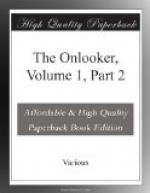For myself I would seek the trend of public opinion in a very different group of plays; in a batch that did not chronicle one single great success, but each of which received a fair meed of popular support. I refer to such plays as “The Second Mrs. Tanqueray,” “A Modern Magdalen,” and “Tess of the D’Urbervilles.” In such plays lies the modern tragedy. They are addressed to the times, actual, intelligible.
But such as held the New York stage in the past season were timorously constructed, bowdlerized by stage managers and, for the most part, poorly acted. Two of the three I have indicated are plays many seasons old. The greatest of these is “The Second Mrs. Tanqueray,” interpreted for us by the greatest actress who ever essayed the part. It indicated a development I believe to be still in its infancy—a development that was arrested before it had been weaned from its first timid suckling.
The public does not desire the problem play. It demands a play that will end with a curtain definite, convincing. But in the problem plays of the past it finds the material it fain would see applied to a bolder, unequivocal purpose. In the eight years that have elapsed since the production of Pinero’s “Tanqueray,” the public’s stomach has been strengthened. It is able to digest tragedies in drawing rooms. It no longer requires peptonized drama. The playgoer no longer demands whatever of primal passion is presented to him to be dressed in doublet and hose. He can accept plain truths in the speech of the day, villains and heroines in the costume of the clubs and Fifth Avenue.
The great play of the future must be a play of the times, must deal with the real things of life, must balk at no expression of modern tendencies, must reveal the skeleton in the twentieth century cupboard.
The days of the historical romance are happily ended. Such milk and water diet is food not fit for men. The new dramatist must provide us with strong meat, properly served by players of intelligence and insight, if dramatic art is to be rescued from the slough into which it has so miserably sunk. The question is: Can America produce a writer of sufficient originality, a manager of sufficient courage, an actor of sufficient understanding to give the public what it asks?
If such there be, their names are not Clyde Fitch or David Belasco, Charles Frohman or Daniel Frohman, Richard Mansfield or Amelia Bingham.
Jaques.
=Artistic Disarray=
A sweet disorder in the dress
Kindles in clothes a wantonness;—
A lawn about the shoulders
thrown
Into a fine distraction—
An erring lace which here
and there
Enthrals the crimson stomacher,—
A cuff neglectful, and thereby
Ribbands to flow confusedly,—
A winning wave deserving note,
In the tempestuous petticoat,—
A careless shoe-string, in
whose tie
I see a wild civility,—
Do more bewitch me, than when
art
Is too precise in every part.




